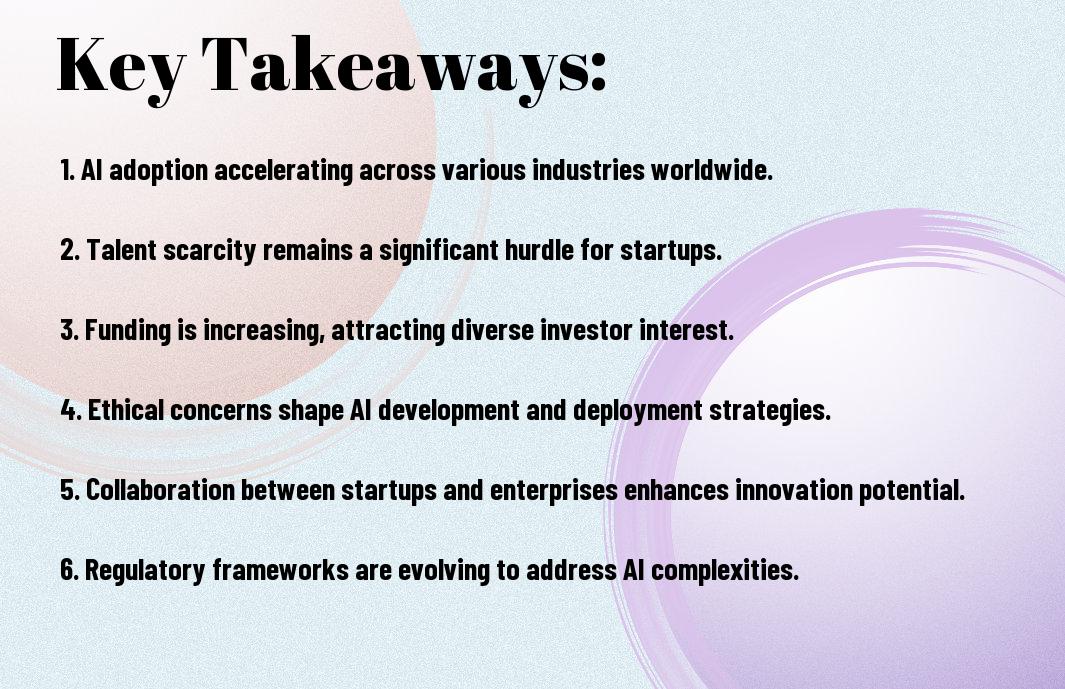As you navigate the rapidly evolving landscape of artificial intelligence, you’re likely aware of the significant impact AI startups are having on the industry. Your interest in this space is well-timed, as the AI startup ecosystem is experiencing unprecedented growth. You’re about to explore a world of innovative technologies, emerging trends, and untapped opportunities, where you’ll discover the challenges and successes of AI startups and how they’re reshaping the future of business and technology, with your understanding of this ecosystem being key to unlocking new possibilities.
Key Takeaways:
- The AI startup ecosystem is rapidly evolving, with increasing investments and innovations in areas such as natural language processing, computer vision, and predictive analytics, leading to new opportunities for growth and development.
- One of the significant challenges faced by AI startups is the shortage of skilled talent, particularly in areas like machine learning and deep learning, which can hinder their ability to develop and implement effective AI solutions.
- AI startups are leveraging emerging technologies like edge AI, explainable AI, and transfer learning to improve the efficiency, transparency, and adaptability of their AI models, enabling them to tackle complex real-world problems.
- Collaboration and partnerships between AI startups, academia, and industry players are crucial for driving innovation, validating AI solutions, and addressing ethical concerns related to AI development and deployment.
- The AI startup ecosystem is expected to continue growing, with potential applications in various industries, including healthcare, finance, and education, offering numerous opportunities for entrepreneurs, investors, and professionals to shape the future of AI and its impact on society.

The Current AI Startup Landscape
The AI startup landscape is evolving rapidly, with new innovations and investments emerging daily, and you are likely to see significant changes in the coming years as you navigate this space.
Market Segments and Concentration
Any analysis of the AI startup ecosystem will show you that it is divided into various segments, including natural language processing, computer vision, and predictive analytics, and you will notice that some of these segments are more concentrated than others.
Regional Distribution and Hubs
On observing the global AI startup landscape, you will find that certain regions have emerged as hubs for AI innovation, with cities like San Francisco, New York, and London leading the way, and you can explore these hubs to discover new opportunities.
Plus, as you investigate deeper into the regional distribution of AI startups, you will notice that governments and private organizations are investing heavily in creating AI-friendly ecosystems, providing you with access to resources, funding, and talent, which can help you succeed in this field.
Investment Patterns
You will notice that investment patterns in the AI startup ecosystem are evolving rapidly, with new trends and opportunities emerging every year, and as you explore this space, you will find that understanding these patterns is key to making informed decisions.
Venture Capital Flows
Against the backdrop of a rapidly changing landscape, venture capital flows into AI startups have increased significantly, and as you analyze these flows, you will see that they are driving innovation and growth in the sector.
Corporate Investment Strategies
Around the world, corporations are developing investment strategies that focus on AI, and as you consider your own approach, you will find that partnering with AI startups can be a key way to drive innovation and stay ahead of the curve.
Also, as you explore deeper into corporate investment strategies, you will discover that many companies are setting up dedicated AI investment funds, and you may want to consider how this approach could work for your own organization, allowing you to tap into the latest AI advancements and apply them to your business.

Technical Foundations
Despite the complexity of AI startups, understanding their technical foundations is vital for you to navigate this ecosystem. You need to grasp the underlying technologies and infrastructure that drive these startups forward.
Core Technologies Driving Growth
Gaining momentum in AI startups is often fueled by advancements in machine learning, natural language processing, and computer vision. You will notice that these technologies are driving innovation and growth in the industry, enabling you to develop more sophisticated solutions.
Infrastructure Requirements
Technologies such as cloud computing, data storage, and high-performance computing are necessary for you to support the development and deployment of AI models. You must consider these infrastructure requirements to ensure your AI startup can scale and perform efficiently.
Driving the success of your AI startup is heavily dependent on the infrastructure you put in place. You will need to consider factors such as data storage, processing power, and security to ensure your AI models can operate effectively. By understanding these infrastructure requirements, you can make informed decisions about your startup’s technical foundation and set yourself up for success in the competitive AI landscape.
Business Models
Keep in mind that AI startups often employ innovative business models, focusing on data-driven services and subscription-based offerings, allowing you to generate revenue through scalable and recurring payments.
Monetization Approaches
To maximize your revenue potential, you can explore various monetization approaches, such as freemium models, advertising, and data licensing, each with its own advantages and challenges that you need to consider.
Customer Acquisition Strategies
With a solid understanding of your target market, you can develop effective customer acquisition strategies, leveraging social media, content marketing, and partnerships to reach your audience and drive growth.
Further, as you refine your customer acquisition strategies, you will find that personalization and user experience play a significant role in converting leads into loyal customers, and you can achieve this by leveraging AI-driven insights to tailor your offerings and interactions to meet the unique needs of your clients.
Competitive Dynamics
Once again, you find yourself navigating the complex AI startup ecosystem, where competition is fierce and trends are constantly evolving, shaping your understanding of the landscape and informing your strategic decisions.
Established Players vs. Newcomers
Among the key factors influencing your success are the dynamics between established players and newcomers, as you consider how to position your own startup for growth and innovation in a crowded market.
Consolidation Trends
Between the lines of industry reports and market analyses, you notice a shift towards consolidation, as larger companies acquire or partner with smaller startups, impacting your own business strategy and potential for partnerships or acquisitions.
Dynamics of consolidation trends suggest that you will need to be adaptable and open to collaborations or acquisitions, as the AI startup ecosystem continues to evolve, and you must consider how these trends will affect your business model and competitive edge, ultimately informing your decisions as you navigate this complex landscape.
Regulatory Environment
Unlike other industries, the AI startup ecosystem operates in a complex regulatory environment that is still evolving. You need to understand the current landscape to navigate your business successfully.
Current Frameworks
Along with existing laws, you will find that various frameworks govern AI development and deployment, influencing your decisions as you build your startup.
Emerging Policy Directions
Against the backdrop of rapid AI advancements, you are likely to see new policy directions emerging, which will impact your business and require adaptability.
Plus, as you examine deeper into emerging policy directions, you will discover that governments are focusing on creating regulations that balance innovation with accountability, and you will need to stay informed to ensure your startup complies with these new guidelines, ultimately shaping your strategy and growth in the AI startup ecosystem.
To wrap up
Considering all points, you now have a comprehensive understanding of the AI startup ecosystem. You can identify trends, challenges, and opportunities that will inform your decisions. With this knowledge, you can navigate the landscape and make informed choices about your investments, partnerships, and strategies. Your grasp of the ecosystem will enable you to capitalize on emerging trends and overcome obstacles, ultimately driving your success in the AI startup space.
FAQ
Q: What are the current trends in the AI startup ecosystem, and how are they shaping the industry?
A: The AI startup ecosystem is currently witnessing significant trends such as the increasing adoption of deep learning, natural language processing, and computer vision. These trends are shaping the industry by enabling startups to develop more sophisticated AI-powered solutions, improving efficiency, and driving innovation. Additionally, the rise of edge AI, explainable AI, and AI for social good are also gaining traction, offering new opportunities for startups to make a positive impact. As the ecosystem continues to evolve, we can expect to see more startups leveraging these trends to create cutting-edge AI solutions that transform various sectors, including healthcare, finance, and education.
Q: What are the major challenges faced by AI startups, and how can they overcome them to achieve success?
A: AI startups face several challenges, including accessing high-quality data, attracting and retaining top talent, and navigating complex regulatory environments. To overcome these challenges, startups can focus on building strong partnerships with data providers, investing in employee development and retention strategies, and engaging with regulatory bodies to shape policies that support AI innovation. Furthermore, startups can also leverage cloud-based infrastructure, open-source tools, and collaborative communities to reduce costs, improve efficiency, and stay up-to-date with the latest advancements in AI research and development. By addressing these challenges proactively, AI startups can position themselves for success and drive growth in the ecosystem.
Q: What opportunities exist for AI startups to create social impact, and how can they balance business goals with social responsibility?
A: AI startups have numerous opportunities to create social impact by developing solutions that address pressing global challenges, such as climate change, healthcare disparities, and education inequality. To balance business goals with social responsibility, startups can prioritize transparency, accountability, and ethics in their AI development and deployment practices. This includes ensuring that AI systems are fair, unbiased, and respectful of human rights, as well as engaging with stakeholders to understand the potential social implications of their technologies. By embracing social responsibility and prioritizing positive impact, AI startups can not only drive business success but also contribute to a more equitable and sustainable future for all, while maintaining a strong reputation and building trust with customers, investors, and the broader community.



